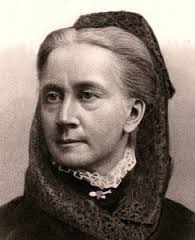Belva Ann Bennett McNail Lockwood was born on October 24, 1830 in Royalton, NewYork. She attended local country schools and at the age of fifteen began teaching to help support the family. At age eighteen she married Uriah H. McNail who died after only five years of marriage leaving Belva with a young daughter to support.
She returned to teaching while pursuing her own studies and earning a B.S. with honors from Genesee College in 1857. Belva assumed the position of preceptress of the Lockport Union School in Lockport, New York where she introduced many innovations including nature walks, public speaking, gymnastics and ice skating.
In 1866 Belva moved to Washington where she opened her own school, the first private coeducational school in the city. At age thirty seven she married Ezekiel Lockwood, a sixty four year old dentist. He supported her in running the school until because of his poor health they closed it in 1877. At the same time, beginning in 1871 Belva had begun preparing for a career in law. She was denied admission to several universities because of her sex, but was finally accepted at the newly established National University Law School. She actually graduated in 1873 but only received her diploma after petitioning President Grant, the school’s ex-officio president. In 1876 she was denied permission to argue a case before the U.S. Supreme court due to “established custom”. Belva lobbied Congress and saw the passage of a bill in 1879 allowing female lawyers to pursue legal matters the rough the highest courts in the country. On Marcy 5th , 1879, she was the first woman to appear before the United States Supreme Court.
As an early feminist, she was instrumental in pushing through legislation in 1872 that guaranteed female government employees equal pay for equal work. In the 1880’s believing that women had made great progress in eliminating the restrictions that inhibited them she turned to the peace movement. She ran for president of the United States in 1884, nominated by the National Equal Rights Party, and received 4,149 votes.
Belva spent her later years practicing law in Washington D.C. and in 1906 she argued a case in Supreme Court on behalf of the Eastern Cherokee Indians which resulted in a $5 million settlement.


No comments:
Post a Comment